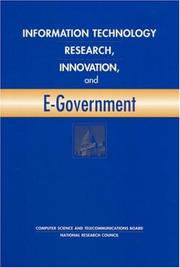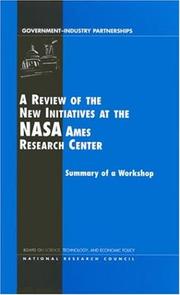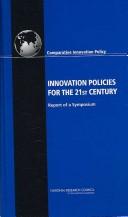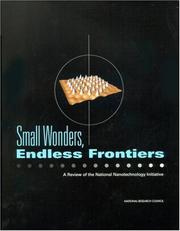| Listing 1 - 10 of 11 | << page >> |
Sort by
|

ISBN: 0309084016 9786610184415 1280184418 0309500311 9780309500319 9780309084017 0305084016 0309169623 Year: 2002 Publisher: Washington, D.C. National Academy Press
Abstract | Keywords | Export | Availability | Bookmark
 Loading...
Loading...Choose an application
- Reference Manager
- EndNote
- RefWorks (Direct export to RefWorks)
Internet in public administration --- Information technology --- Internet dans l'administration publique --- Technologie de l'information --- Research. --- Recherche --- Information technology -- Research. --- Internet in public administration -- United States. --- Research --- IT (Information technology) --- Technology --- Telematics --- Information superhighway --- Knowledge management

ISBN: 0309074096 0309502780 9780309502788 9780309074094 0305074096 0309170907 Year: 2001 Publisher: Washington, D.C. National Academy Press
Abstract | Keywords | Export | Availability | Bookmark
 Loading...
Loading...Choose an application
- Reference Manager
- EndNote
- RefWorks (Direct export to RefWorks)
Ames Research Center -- Congresses. --- Electronic books. -- local. --- Industrial policy -- United States -- Congresses. --- Research -- Government policy -- United States -- Congresses. --- Research -- United States -- Congresses. --- Science and industry -- Government policy -- United States -- Congresses. --- Technology -- Research -- Government policy -- United States -- Congresses. --- Technology -- Research -- United States -- Congresses. --- Research --- Science and industry --- Industrial policy --- Technology --- Sciences - General --- Physical Sciences & Mathematics --- Government policy --- Ames Research Center --- Applied science --- Arts, Useful --- Science, Applied --- Useful arts --- Industry and science --- Science --- Science research --- Scientific research --- United States. --- NASA/Ames Research Center --- N.A.S.A./Ames Research Center --- Industrial arts --- Material culture --- Industries --- Information services --- Learning and scholarship --- Methodology --- Research teams --- Ames Aeronautical Laboratory
Book
ISBN: 1447360753 144736077X Year: 2022 Publisher: Bristol Policy Press
Abstract | Keywords | Export | Availability | Bookmark
 Loading...
Loading...Choose an application
- Reference Manager
- EndNote
- RefWorks (Direct export to RefWorks)
Since the mid-2010s, virtual reality (VR) technology has advanced rapidly. This book explores the many opportunities that VR can offer for humanities and social sciences researchers. It provides a user-friendly, non-technical methods guide to using ready-made VR content and 360° video as well as creating custom materials.
Virtual reality. --- Humanities --- Social sciences --- Behavioral sciences --- Human sciences --- Sciences, Social --- Social science --- Social studies --- Civilization --- Learning and scholarship --- Classical education --- Environments, Virtual --- Virtual environments --- Virtual worlds --- Computer simulation --- Reality --- Research --- Computer simulation. --- Methodology. --- Creative research methods; Digital methods; Immersive environments; New technology; Research methods; Social research methods; Virtual reality
Book
ISBN: 3642053173 3642053181 Year: 2010 Publisher: Beijing : Heidelberg : Science Press ; Springer,
Abstract | Keywords | Export | Availability | Bookmark
 Loading...
Loading...Choose an application
- Reference Manager
- EndNote
- RefWorks (Direct export to RefWorks)
As one of the eighteen field-specific reports comprising the comprehensive scope of the strategic general report of the Chinese Academy of Sciences, this sub-report addresses long-range planning for developing science and technology in the field of advanced materials science. They each craft a roadmap for their sphere of development to 2050. In their entirety, the general and sub-group reports analyze the evolution and laws governing the development of science and technology, describe the decisive impact of science and technology on the modernization process, predict that the world is on the eve of an impending S&T revolution, and call for China to be fully prepared for this new round of S&T advancement. Based on the detailed study of the demands on S&T innovation in China's modernization, the reports draw a framework for eight basic and strategic systems of socio-economic development with the support of science and technology, work out China's S&T roadmaps for the relevant eight basic and strategic systems in line with China's reality, further detail S&T initiatives of strategic importance to China's modernization, and provide S&T decision-makers with comprehensive consultations for the development of S&T innovation consistent with China's reality. Supported by illustrations and tables of data, the reports provide researchers, government officials and entrepreneurs with guidance concerning research directions, the planning process, and investment. Founded in 1949, the Chinese Academy of Sciences is the nation's highest academic institution in natural sciences. Its major responsibilities are to conduct research in basic and technological sciences, to undertake nationwide integrated surveys on natural resources and ecological environment, to provide the country with scientific data and consultations for government's decision-making, to undertake government-assigned projects with regard to key S&T problems in the process of socio-economic development, to initiate personnel training, and to promote China's high-tech enterprises through its active engagement in these areas.
Materials -- China. --- Materials -- Research -- China. --- Materials. --- Technology -- China. --- Technology -- Research -- China. --- Technology. --- Materials --- Technology --- Research --- Applied science --- Arts, Useful --- Science, Applied --- Useful arts --- Engineering --- Engineering materials --- Industrial materials --- Economic policy. --- Materials science. --- Optical materials. --- Electronic materials. --- Economics. --- R & D/Technology Policy. --- Optical and Electronic Materials. --- Materials Science, general. --- Science --- Industrial arts --- Material culture --- Engineering design --- Manufacturing processes --- Optics --- Economic nationalism --- Economic planning --- National planning --- State planning --- Economics --- Planning --- National security --- Social policy --- Material science --- Physical sciences --- Electronic materials

ISBN: 0309103169 9786610934638 1280934638 0309665256 9780309665254 9781280934636 9780309103169 0309179025 6610934630 Year: 2007 Publisher: Washington, D.C. National Academies Press
Abstract | Keywords | Export | Availability | Bookmark
 Loading...
Loading...Choose an application
- Reference Manager
- EndNote
- RefWorks (Direct export to RefWorks)
Technological innovations -- Government policy -- United States -- Congresses. --- Technology -- Research -- Congresses. --- Technology and state -- Congresses. --- Technological innovations --- Technology and state --- Technology --- Business & Economics --- Economic History --- Government policy --- Research --- Applied science --- Arts, Useful --- Science, Applied --- Useful arts --- Breakthroughs, Technological --- Innovations, Industrial --- Innovations, Technological --- Technical innovations --- Technological breakthroughs --- Technological change --- Science --- Industrial arts --- Material culture --- Creative ability in technology --- Inventions --- Domestication of technology --- Innovation relay centers --- Research, Industrial --- Technology transfer --- E-books
Book
ISBN: 3790827800 3790827819 9786613469595 1283469596 Year: 2011 Publisher: New York : Springer,
Abstract | Keywords | Export | Availability | Bookmark
 Loading...
Loading...Choose an application
- Reference Manager
- EndNote
- RefWorks (Direct export to RefWorks)
This editorial book presents twelve contributions from the German “Wirtschaftsinformatik” that exemplify the contemporary approach of theory-guided modeling and empiricism which complements existing approaches. It summarizes recent research which has been presented at major international and national conferences in order to demonstrate the growing importance of this stream of research.
Computer science -- Research. --- Computer science. --- Information systems. --- Information technology -- Research. --- Computer science --- Information technology --- Commerce --- Engineering & Applied Sciences --- Business & Economics --- Commerce - General --- Computer Science --- Research --- Management information systems. --- Research. --- Informatics --- Computer-based information systems --- EIS (Information systems) --- Executive information systems --- MIS (Information systems) --- IT (Information technology) --- Information technology. --- IT in Business. --- Information Systems and Communication Service. --- Models and Principles. --- Science --- Sociotechnical systems --- Information resources management --- Management --- Technology --- Telematics --- Information superhighway --- Knowledge management --- Communication systems --- Business—Data processing. --- Computers. --- Automatic computers --- Automatic data processors --- Computer hardware --- Computing machines (Computers) --- Electronic brains --- Electronic calculating-machines --- Electronic computers --- Hardware, Computer --- Computer systems --- Cybernetics --- Machine theory --- Calculators --- Cyberspace

ISBN: 0309084547 9786610183630 1280183632 0309502330 9780309084543 9780309502337 0309086558 9780309086554 0309169445 Year: 2002 Publisher: Washington, DC : National Academy Press,
Abstract | Keywords | Export | Availability | Bookmark
 Loading...
Loading...Choose an application
- Reference Manager
- EndNote
- RefWorks (Direct export to RefWorks)
Electronic books. -- local. --- Nanotechnology -- Research -- United States. --- Technology -- Research -- United States. --- Nanotechnology --- Natural Science Disciplines --- Manufactured Materials --- Social Sciences --- Miniaturization --- Quality of Health Care --- Health Care Evaluation Mechanisms --- Evaluation Studies as Topic --- Disciplines and Occupations --- Health Services Administration --- Investigative Techniques --- Technology --- Technology, Industry, and Agriculture --- Anthropology, Education, Sociology and Social Phenomena --- Analytical, Diagnostic and Therapeutic Techniques and Equipment --- Technology, Industry, Agriculture --- Health Care --- Health Care Quality, Access, and Evaluation --- Program Evaluation --- Government Programs --- Nanostructures --- Engineering & Applied Sciences --- Technology - General --- Research --- Applied science --- Arts, Useful --- Science, Applied --- Useful arts --- Molecular technology --- Nanoscale technology --- Science --- Industrial arts --- Material culture --- High technology
Book
ISBN: 1282451235 9786612451232 0833048163 083304513X 9780833048165 9781282451230 9780833045133 6612451238 Year: 2008 Publisher: Santa Monica, CA : Rand Corp.,
Abstract | Keywords | Export | Availability | Bookmark
 Loading...
Loading...Choose an application
- Reference Manager
- EndNote
- RefWorks (Direct export to RefWorks)
This professional memoir describes RAND's contributions to the evolution of computer science, particularly during the first decades following World War II, when digital computers succeeded slide rules, mechanical desk calculators, electric accounting machines, and analog computers. RAND's accomplishments included important advances not only in hardware and software but also in analytic techniques that exploited the speed and power of computers. From the beginning, RAND researchers were focused on using computers to improve applied studies that addressed complex, real-world problems. They also
Computer science --Research --United States --History. --- Information technology --Research --United States --History. --- Military research --United States --History --20th century. --- Rand Corporation --History. --- Research institutes --United States --History --20th century. --- Information technology --- Computer science --- Military research --- Research institutes --- Computer Science --- Engineering & Applied Sciences --- History --- Research --- History. --- Rand Corporation --- Institutes, Research --- Research centers --- Think tanks --- Universities and colleges --- Defense research --- Informatics --- IT (Information technology) --- RAND --- RĖND --- RĖND, SShA --- Muʼassasat Rānd --- Lande gong si --- Meiguo Lande gong si --- 兰德公司 --- 美国兰德公司 --- Rėnd Korporeĭshn --- Рэнд Корпорейшн --- Learned institutions and societies --- Research and development contracts, Government --- Science --- Technology --- Telematics --- Information superhighway --- Knowledge management
Book
ISBN: 1441961070 9786613350756 1283350750 1441961089 Year: 2012 Publisher: New York : Springer,
Abstract | Keywords | Export | Availability | Bookmark
 Loading...
Loading...Choose an application
- Reference Manager
- EndNote
- RefWorks (Direct export to RefWorks)
The overall mission of this book is to provide a comprehensive understanding and coverage of the various theories and models used in IS research. Specifically, it aims to focus on the following key objectives: To describe the various theories and models applicable to studying IS/IT management issues. To outline and describe, for each of the various theories and models, independent and dependent constructs, reference discipline/originating area, originating author(s), seminal articles, level of analysis (i.e. firm, individual, industry) and links with other theories. To provide a critical review/meta-analysis of IS/IT management articles that have used a particular theory/model. To discuss how a theory can be used to better understand how information systems can be effectively deployed in today’s digital world. This book contributes to our understanding of a number of theories and models. The theoretical contribution of this book is that it analyzes and synthesizes the relevant literature in order to enhance knowledge of IS theories and models from various perspectives. To cater to the information needs of a diverse spectrum of readers, this book is structured into two volumes, with each volume further broken down into two sections. The first section of Volume 1 presents detailed descriptions of a set of theories centered around the IS lifecycle, including the Success Model, Technology Acceptance Model, User Resistance Theories, and four others. The second section of Volume 1 contains strategic and economic theories, including a Resource-Based View, Theory of Slack Resources, Portfolio Theory, Discrepancy Theory Models, and eleven others. The first section of Volume 2 concerns socio-psychological theories. These include Personal Construct Theory, Psychological Ownership, Transactive Memory, Language-Action Approach, and nine others. The second section of Volume 2 deals with methodological theories, including Critical Realism, Grounded Theory, Narrative Inquiry, Work System Method, and four others. Together, these theories provide a rich tapestry of knowledge around the use of theory in IS research. Since most of these theories are from contributing disciplines, they provide a window into the world of external thought leadership.
Information technology -- Research -- Methodology. --- Electrical & Computer Engineering --- Commerce --- Engineering & Applied Sciences --- Business & Economics --- Information Technology --- Commerce - General --- Management information systems --- Information society --- Research. --- Computer-based information systems --- EIS (Information systems) --- Executive information systems --- MIS (Information systems) --- Business. --- Information technology. --- Business --- Computers. --- Business and Management. --- IT in Business. --- Information Systems and Communication Service. --- Information Systems Applications (incl. Internet). --- Data processing. --- Sociology --- Information superhighway --- Sociotechnical systems --- Information resources management --- Management --- Communication systems --- Information systems. --- IT (Information technology) --- Technology --- Telematics --- Knowledge management --- Business—Data processing. --- Application software. --- Application computer programs --- Application computer software --- Applications software --- Apps (Computer software) --- Computer software --- Automatic computers --- Automatic data processors --- Computer hardware --- Computing machines (Computers) --- Electronic brains --- Electronic calculating-machines --- Electronic computers --- Hardware, Computer --- Computer systems --- Cybernetics --- Machine theory --- Calculators --- Cyberspace
Book
ISBN: 1441997067 9786613351326 1283351323 1441997075 Year: 2012 Publisher: New York : Springer,
Abstract | Keywords | Export | Availability | Bookmark
 Loading...
Loading...Choose an application
- Reference Manager
- EndNote
- RefWorks (Direct export to RefWorks)
The overall mission of this book is to provide a comprehensive understanding and coverage of the various theories and models used in IS research. Specifically, it aims to focus on the following key objectives: To describe the various theories and models applicable to studying IS/IT management issues. To outline and describe, for each of the various theories and models, independent and dependent constructs, reference discipline/originating area, originating author(s), seminal articles, level of analysis (i.e. firm, individual, industry) and links with other theories. To provide a critical review/meta-analysis of IS/IT management articles that have used a particular theory/model. To discuss how a theory can be used to better understand how information systems can be effectively deployed in today’s digital world. This book contributes to our understanding of a number of theories and models. The theoretical contribution of this book is that it analyzes and synthesizes the relevant literature in order to enhance knowledge of IS theories and models from various perspectives. To cater to the information needs of a diverse spectrum of readers, this book is structured into two volumes, with each volume further broken down into two sections. The first section of Volume 1 presents detailed descriptions of a set of theories centered around the IS lifecycle, including the Success Model, Technology Acceptance Model, User Resistance Theories, and four others. The second section of Volume 1 contains strategic and economic theories, including a Resource-Based View, Theory of Slack Resources, Portfolio Theory, Discrepancy Theory Models, and eleven others. The first section of Volume 2 concerns socio-psychological theories. These include Personal Construct Theory, Psychological Ownership, Transactive Memory, Language-Action Approach, and nine others. The second section of Volume 2 deals with methodological theories, including Critical Realism, Grounded Theory, Narrative Inquiry, Work System Method, and four others. Together, these theories provide a rich tapestry of knowledge around the use of theory in IS research. Since most of these theories are from contributing disciplines, they provide a window into the world of external thought leadership.
Information technology. --- Information technology -- Research -- Methodology. --- Commerce --- Electrical & Computer Engineering --- Engineering & Applied Sciences --- Business & Economics --- Commerce - General --- Information Technology --- Management information systems. --- Information theory. --- Communication theory --- Computer-based information systems --- EIS (Information systems) --- Executive information systems --- MIS (Information systems) --- Business. --- Business --- Computers. --- Business and Management. --- IT in Business. --- Information Systems and Communication Service. --- Information Systems Applications (incl. Internet). --- Data processing. --- Communication --- Cybernetics --- Sociotechnical systems --- Information resources management --- Management --- Communication systems --- Information systems. --- IT (Information technology) --- Technology --- Telematics --- Information superhighway --- Knowledge management --- Business—Data processing. --- Application software. --- Application computer programs --- Application computer software --- Applications software --- Apps (Computer software) --- Computer software --- Automatic computers --- Automatic data processors --- Computer hardware --- Computing machines (Computers) --- Electronic brains --- Electronic calculating-machines --- Electronic computers --- Hardware, Computer --- Computer systems --- Machine theory --- Calculators --- Cyberspace
| Listing 1 - 10 of 11 | << page >> |
Sort by
|

 Search
Search Feedback
Feedback About UniCat
About UniCat  Help
Help News
News